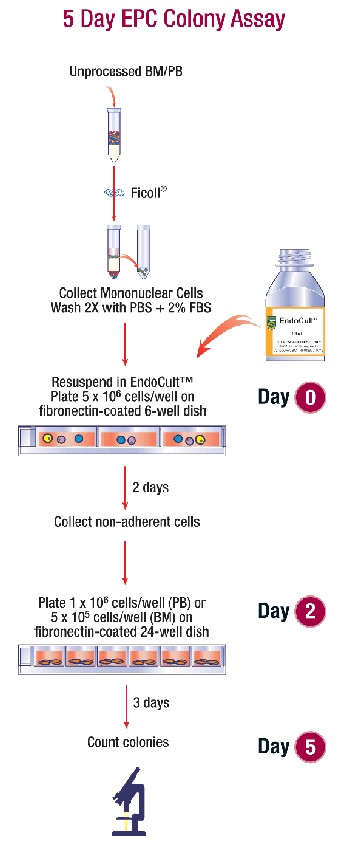|
products
EndoCult Liquid Medium Kit
EndoCult Colony Atlas
Support Products-Cytokines and Growth Factors
background
Blood vessel development is a regulated process involving the proliferation, and migration of endothelial cells from adjacent pre-existing blood vessels (angiogenesis), or following differentiation of endothelial progenitor cells from mesodermal precursors (vasculogenesis).1,2 Endothelial progenitor cells (EPCs) or angioblasts were originally thought to be present only during embryonic development. However, evidence accumulating over several years suggests that they can persist in adult life.1,2 This has generated interest in the use of EPCs for neovascularization of ischemic or injured tissue and for the clinical assessment of risk factors for various diseases.3-5
EPC culture assay
An in vitro assay has been established for the culture and quantitation of endothelial progenitor cells from peripheral blood3 and bone marrow. In this protocol, mononuclear cells are isolated by Ficoll?/FONT> density gradient centrifugation and plated on fibronectin-coated 6-well plates in EndoCult?Medium. After 48 hours, non-adherent cells are collected and plated in replicate fibronectin-coated 24-well plates. Colonies are evaluated and quantified three days later. A colony is defined as a central core of "round" cells with more elongated "sprouting cells" at the periphery and are referred to as early outgrowth colony forming unit - endothelial cell (CFU-EC).3 The endothelial lineage of these cells has been confirmed by immunocytochemical staining for von Willebrand Factor, vascular endothelial growth factor recepter 2,3 and CD31.3
the EndoCult?products and in vitro culture assay provide tools for:
Further defining the phenotype of EPC from peripheral blood and bone marrow.
Analyzing the differentiation pathway for the endothelial lineage.
Use as a diagnostic tool in clinical studies.

Also available: ES-Cult?Endothelial products for the in vitro differentiation of mouse ES cells into endothelial cells.
|